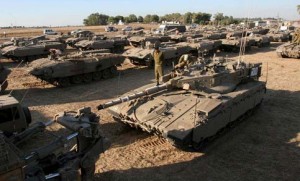B2W has been providing nearly daily updates on Israel’s preparations for an attack on Iran. Further evidence of an imminent Israeli attack on Iran appeared Monday in the Israeli news media. Alon Ben-David a Channel 10 reporter provided insider commentary that Prime Minister Benjamin Netanyahu was “closer than ever” to a decision to attack and was “determined to attack Iran before the U.S. elections.” He further noted that there were strong divisions behind the scenes in the Israeli government regarding the decision to attack. The Israeli President Shimon Peres, its army’s top generals, the intelligence community, and the United States were opposed to an attack. Ben-David finished stating that he didn’t think anything President Obama could say at this point could change Netanyahu’s decision.
These statements are particularly telling. For one, the opposition inside Israel’s military and intelligence communities suggest that the attack plan has some significant risks and that the intelligence does not suggest an imminent threat from Iran. This apprehension seems to match what the U.S. military and intelligence communities have concluded specific to Iran’s nuclear program and should be a red-flag for anyone in the U.S. wanting to charge head first into another war.
The statements respective of the attack being timed before the U.S. election also follows B2W analyst predictions. Specifically, any attack launched before the U.S. elections forces President Obama’s hand into supporting Israel or risking looking weak and unsupportive to Israel, which could likely cost him the election. The notion that Netanyahu can’t be talked out of it is very disturbing and suggests his mind is made up on an attack. This should worry analysts because even though there is signficant opposition to an attack within Israel, Netanyahu carries significant power and can muster a majority of support within the government.
Based on this reporting, B2W analysts are continuing to maintain that not only is an Israeli strike likely, it will most likely occur between September 15th and October 15th. This window covers two new moon phases beginning two days before Rosh Hashana and ending with the next new moon. This block corresponds well to the timing of previous Israeli military strikes in early fall during waxing or waning moon phases close to a new moon. It also allows for the U.N. General Assembly, which begins on the September 18th, to become the forum Israel can use to broker a cease-fire after it has struck Iran hard in the event the war doesn’t go well or the U.S. doesn’t enter the war on Israel’s behalf.
Beyond October 15th, B2W analysts see increasingly diminishing chances of an attack until after the November elections. This would be getting too close to the election for the impact of U.S. support for or against the war to affect the outcome. In fact, the current President could bluff support until after the election and then do nothing for Israel. However, a strike much earlier allows Israel’s lobby time to build pressure on both candidates to take action on Israel’s behalf. Also, beyond October 15th, the moon is in a waxing phase moving daily away from optimum low light conditions for an attack.
Why should you care? Both American and world interests are at stake. An Israeli strike will be a disaster for the region and world economies. Further, any unilateral strike will likely place the U.S. military and NATO forces in serious jeopardy and likely lead to many more unnecessary deaths if Iran chooses to rightfully retaliate broadly. As such, any attack by Israel against Iran must be stopped and other avenues to peace exhausted.
By Guiles Hendrik
